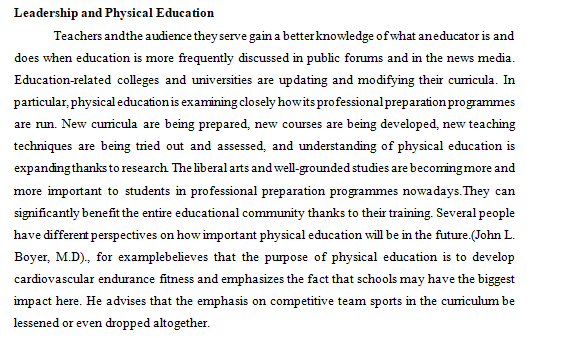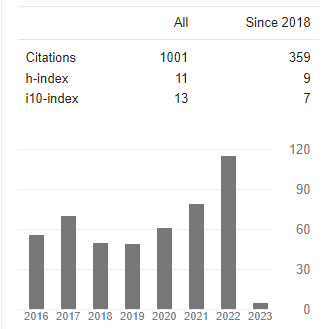EFFECTIVE LEADERSHIP QUALITIES IN PHYSICAL EDUCATION AND SPORTS
Abstract
Through the practice of leadership, a person can persuade others to work towards a common goal and guide the organization towards greater coherence and coherence. Excellent leaders may be developed, not born. You can become a successful leader if you have the motivation and willpower. A never-ending process of self-study, education, training, and experience is how good leaders are created. (Jago, 1982). We are aware of the characteristics that can affect our behaviour, though. Trait Leadership is what we call this (Jago, 1982). In that it used to be commonplace to think that leaders were more likely to be born than created. In particular, physical education is examining closely how its professional preparation programmes are run. New curricula are being prepared, new courses are being developed, new teaching techniques are being tried out and assessed, and understanding of physical education is expanding thanks to research. The liberal arts and well-grounded studies are becoming more and more important to students in professional preparation programme nowadays. They can significantly benefit the entire educational community thanks to their training. Many books and articles have been written detailing what it takes to run a company effectively. Some academics and authors contend that outstanding leaders have particular skills or abilities, while others assert that it all comes down to personality. Others claim that behaviors, rather than intentions or thoughts, are what matter. Leaders are people with extraordinary character who can help others get through a difficult situation.
Downloads
References
Kryshtanovych, S., Bilyk, O., Shayner, H., Barabash, O., & Bondarenko, V. (2021). Study of the Experience of the Formation of Professional Competence in Future Managers of Physical Education and Sports. Revista Romaneasca Pentru Educatie Multidimensionala, 13(1Sup1), 162-176.
http://en.wikipedia.org/wiki/Difference between Leadership and Management.
http://en.wikipedia.org/wiki/5 qualities of good leadership
http://en.wikipedia.org/wiki/Leadership Qualities Checklist
www.GROCO.comRetrieved on 11/12/2015
Stevens, M., Rees, T., & Cruwys, T. (2021). Social identity leadership in sport and exercise: Current status and future directions. Psychology of Sport and Exercise, 55, 101931.
Singh Nathial, Analysis of set shot in basketball in relation with time to perform the course and displacement of center of gravity, American Journal of Sports Science, Vol.2 Issue.5 pp: 122-126 (2014). Retrieved from https://www.sciencepublishinggroup.com/journal/paperinfo.aspx?journalid=155&doi=10.11648/j.ajss.20140205.13
Mandeep Singh (2010). Evaluation And Improvement Of Sports Techniques Through Biomechanical Updated Analyzing Technology, University News, Journal of Higher Education Association of Indian Universities, Association of Indian Universities, Vol:48:Issue.05;2010 Pp45-57, 2010
Mandeep Singh Nathial, A Study of Adjustment and Emotional Intelligence of University Coaches in India, American Journal of Applied Psychology. Volume 3, Issue 6, November 2014 , pp. 122-126. doi: 10.11648/j.ajap.20140306.11
Nathial, Mandeep Singh. A COMPARATIVE AND ANALYTICAL STUDY OF SELF-ESTEEM AND JOB SATISFACTION IN ATHLETES AND NON ATHLETES. Journal of Advances in Social Science and Humanities, 2(10).https://doi.org/10.15520/jassh210123
Singh, M., Kour, R., & Kour, A.,. A collaborative diversified investigation of respective responses of sports person coaches and organizations on criminalization of doping.International Journal of Health Sciences,6(S3), 11295–11310. https://doi.org/10.53730/ijhs.v6nS3.8641
Mandeep Singh., Assessment of Vocational Interests of Pahadi&Bakarwal School Students In Relation To Their Gender. Int J Recent Sci Res. 9(3), pp. 24817-24819. DOI: http://dx.doi.org/10.24327/ijrsr.2018.0903.1731
Miller, A. J., Slater, M. J., & Turner, M. J. (2020). Coach identity leadership behaviours are positively associated with athlete resource appraisals: The mediating roles of relational and group identification. Psychology of Sport and Exercise, 51, 101755.
Stevens, M., Rees, T., Coffee, P., Steffens, N. K., Haslam, S. A., & Polman, R. (2020). Leading us to be active: A two-wave test of relationships between identity leadership, group identification, and attendance. Sport, Exercise, and Performance Psychology, 9(1), 128.
SINGH SIDHU, A., & SINGH, M. (2022). KINEMATICAL ANALYSIS OF HURDLE CLEARANCE TECHNIQUE IN 110M HURDLE RACE. International Journal of Behavioral Social and Movement Sciences, 4(2), 28–35. Retrieved from https://ijobsms.org/index.php/ijobsms/article/view/267
Singh, A., & Singh , D. M. (2013). PROMOTION OF RESEARCH CULTURE –ENHANCING QUALITY IN HIGHER EDUCATION. International Journal of Behavioral Social and Movement Sciences, 2(2), 202–208. Retrieved from https://ijobsms.org/index.php/ijobsms/article/view/152
SINGH, M., & SINGH SIDHU, A. (2016). A COMPARATIVE STUDY OF BODY COMPOSITION AND RELATIVE HEALTH STATUS AMONG RESIDENT AND NON-RESIDENT STUDENTS IN DIFFERENT SCHOOLS OF J&K. International Journal of Behavioral Social and Movement Sciences, 5(3), 08–13. Retrieved from https://ijobsms.org/index.php/ijobsms/article/view/320
Singh Nathial, D. M. (2012). ANALYZING THE CREDIT BASED SYSTEM IN PHYSICAL EDUCATION. International Journal of Behavioral Social and Movement Sciences, 1(3), 172–176. Retrieved from https://ijobsms.org/index.php/ijobsms/article/view/37
SHARMA, N. P., & SINGH, M. (2014). SENIOR AGE GROUP RELATIVE EXERCISES AND IMPACT ON THEIR LIFESTYLE. International Journal of Behavioral Social and Movement Sciences, 3(04), 78–82. Retrieved from https://ijobsms.org/index.php/ijobsms/article/view/246
CHAND PURI, P., MISHRA, P., JHAJHARIA, B., & SINGH, M. (2014). COORDINATIVE ABILITIES OF VOLLEYBALL IN DIFFERENT AGE GROUPS: A COMPARATIVE STUDY. International Journal of Behavioral Social and Movement Sciences, 3(3), 56–68. Retrieved from https://ijobsms.org/index.php/ijobsms/article/view/228
Bruner, M. W., McLaren, C. D., Mertens, N., Steffens, N. K., Boen, F., McKenzie, L., ... & Fransen, K. (2022). Identity leadership and social identification within sport teams over a season: A social network analysis. Psychology of Sport and Exercise, 59, 102106.

Copyright (c) 2023 Anu Sharma, Jyoti Bala, Davinder Singh

This work is licensed under a Creative Commons Attribution 4.0 International License.














